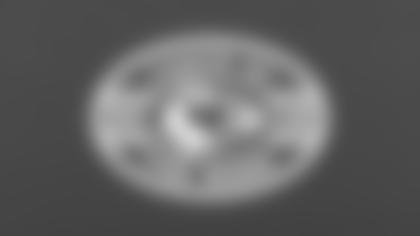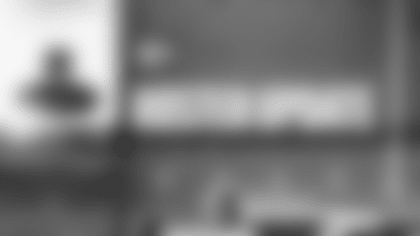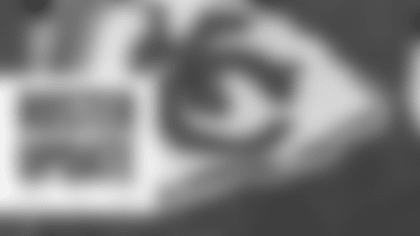Just over one year removed from John Dorsey's first-career combine press conference, the team's general manager addressed the media in Indianapolis on Friday, addressing topics like the Chiefs free agents, evaluations of Kansas City's offensive line and wide receivers and much, much more.
OPENING STATEMENT: "Afternoon, guys. Good to see you all. It's always a pleasure to be here at the combine and with that, I'll take your questions."
Q: Ted Thompson said that you are a real scout. Is being a real scout the genesis of being a general manager?
DORSEY: "Well, it's the ability to evaluate talent. I think Ted (Thompson), too, is a real scout. He's had a history of evaluating and selecting really good players, and I think that's what you do as this process unfolds."
Q: Congrats on the PFWA Executive of the Year Award. Where do you see WR A.J. Jenkins fitting in moving forward?
DORSEY: "Well, I appreciate that and that is a reflection of everybody in the organization. With regards to A.J. (Jenkins), I think he has made great strides this year. As the season unfolded, he became comfortable with the offensive scheme and towards the end of the season, he got very comfortable. That's a credit to the coaching staff. Coach (David) Culley did a marvelous job. He did some nice things in the playoff game and I expect him to (have) a really nice second season with the Kansas City Chiefs."
Q: How do you feel about the offensive line and the free agents you have there?
DORSEY: "I think that as the season unfolded, they got used to the new scheme. I think that Andy Heck and Eugene Chung do a nice job. I think they're the youngest offensive line in the National Football League. They came together, they grouped together and towards the end of the season they were starting their groom, so I see this moving forward as a very good positive. With regards to some of the free agents, we've had ongoing conversations with their representatives, and we'll continue."
Q: There have been reports you're not signing Branden Albert. Is there any truth to that?
DORSEY: "We have ongoing conversations with all of our unrestricted free agents. We've had conversations with Branden (Albert's) representatives. That's the beauty of the combine is those guys are here, and we'll continue that conversation with those representatives as the combine passes."
Q: How hard is it to be disciplined to go after the best player available in the Draft?
DORSEY: "Well, I think every year you go through the draft process, regardless if you're selecting one or (23rd). You begin to build your board and then you begin to identify certain players that will unfold at certain slots. Then as you go through there, then you can determine who these players are that fit those criteria that you have set up. That's how that unfolds and you do have to be disciplined because when you build through the draft, discipline is so critical. You have to take the best player available, not thinking instantaneously, but also thinking down the road in terms of the future, two years or three years down the road."
Q: If you have a need and that's not the best player available what do you do?
DORSEY: "I think that history has shown that if you stay true to that model, the best player will usually prevail."
Q: What about if there is a guy that is two slots down, but you are in need of a certain player? How much wiggle room do you have?
DORSEY: "There is a lot of value in two slots, as you can see with some of those picks that are given up. Again, it's the art of discipline. I've been taught that at a very early stage in my career by Ron Wolf. He stayed true to that and that's what we'll do. We'll always stay disciplined to that number."
Q: How much wiggle room is it for certain players?
DORSEY: "Well, if the player is one spot above, that means that I would have to give something away for somebody who I didn't deem was the best available player. Why would I do that?"
Q: What did Weston Dressler show you to sign a guy from the Canadian Football League?
DORSEY: "Well, in that market, what Weston (Dressler) is, is he has shown on his film from the CFL is he's very competitive. What we do as an organization is we try to turn over every stone we possibly can to find players that will (give us) competitive depth that we've always talked about. I think he's a very unique player. He'll have a little bit of return thing in here. Andy (Reid) uses certain players and finds roles for them, I think that's interesting. But, again, what that is is a player you bring into camp and let's see how he competes and let's see how he fits. That's kind of what you do there."
Q: What was the postseason evaluation of the wide receivers as a group?
DORSEY: "You know what, I'll be honest with you and you think I'm going to fudge on this, but this is the truth now, I've been in draft meetings for like two weeks now and I have a stack of reports by the coaches on terms of self-evaluation, so that's sitting on my desk. If I were to assess, I think David (Culley) did a nice job in their first year. They grew; they matured as the season went along. Of course, we expect them to mature and grow in the second season of this offense, and with this coaching staff, I have no doubt that they will."
Q: Is Eric Fisher your left tackle this year?
DORSEY: "Is he our left tackle? No, I think right now he's our right tackle."
Q: Is that a logical next step for him?
DORSEY: "Well, I think the one thing I'm proud about Eric (Fisher) is I think he made great strides as the season went along. You could see a great degree of comfort with him in the second half of the season and really what that is, is that is a credit to Andy Heck and Eugene Chung and their abilities to coach. I've always said that between the first and second year, that's when those guys make their greatest strides and I expect great things from Eric in his second year."
Q: How is Andy Reid about stepping back and letting your guys do their job with scouting?
DORSEY: "You know, when I first got to Kansas City last year in January, I said that the greatest thing about this relationship is when the head coach and the general manager, philosophically, are on the same page and they go to work every day and they want to work to get better. That's very meaningful, because that's what successful organizations do. With Andy (Reid), Andy is one of those guys that lets you do that, and he trusts me enough to do that. I have great respect for Andy, and that's kind of the way that Clark (Hunt) laid that whole system out; so far, it has worked pretty well."
Q: How much influence do the coaches have when you're scouting players?
DORSEY: "Well we have always said that this is a collective effort by everybody within the organization. At the end of the day, we're going to make a pick for the Kansas City Chiefs. What we are doing right now and what I'm trying to do is to get Andy (Reid) to understand exactly who these players are and it's for me to get him up to speed on that so he can have a good, comfortable feel for them."
Q: Is it reasonable to expect Jamaal Charles to have as high of a number of touches as he did this last year?
DORSEY: "I will say this, when I first got there I knew that Jamaal (Charles) was very fast, very talented, but I didn't realize how tough he was. I mean he is unbelievable. With that being said, I think as the end of the year came along you saw Knile Davis begin to develop that role to take some reps away to make Jamaal a little fresher in the fourth quarter. If you can have a two headed running attack with Knile, with Jamaal, I think that helps everybody."
Q: How important is it to you to have a great safety?
DORSEY: "Well I think the game of football has changed over the last five years. The ability for safeties to cover means something now because they're passing and spreading the ball out a little bit more. Nick Collins was a very good player. I think that Eric Berry is a very fine football player, and I think the safety position is like all of them. They're vitally important in today's football."
Q: Are there a lot of safeties who can cover very well?
DORSEY: "Well I could sit here and do a list of what the requirements of this and that are, but at the end of the day, (you ask) does the guy make plays? That's kind of what you're looking for."
Q: Do any of the players who sign as free agents have any effect on who you draft?
DORSEY: "No, I don't think so."
Q: What are you looking at when you're looking at defensive backs?
DORSEY: "Well you're looking at competition as they compete against their peers. Of course you're looking at similar athletic movements as they twist and turn. I think it's a combination of looking for athleticism and competitiveness within the drills."













